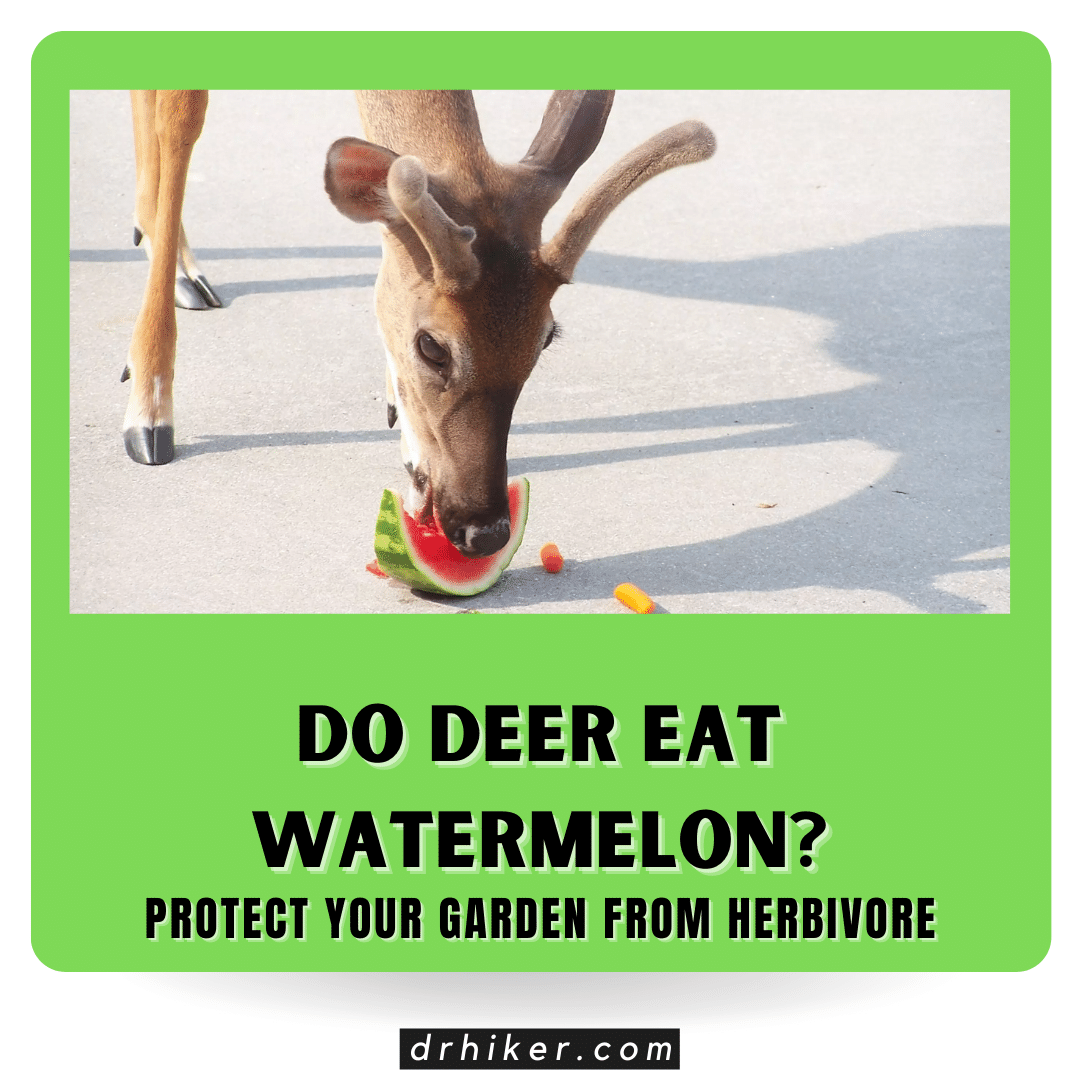Deer also enjoy eating apples, persimmons, and melons but avoid bitter foods. If you have watermelons in your garden, you should look for ways to keep deer away from ruining everything. Due to the large size of watermelons, they can’t eat whole but will puncture the rind to eat the juicy fruit and leave leftovers behind.
If you are worried about the damage caused by deer to watermelons, this guide will help you to protect your garden or yard with these herbivores.
Do Deer Eat Watermelon?

Yes, deer eat watermelon because they are juicy, delicious, and fully packed with nutritional benefits. Watermelons contain Vitamins A and C along with Potassium and magnesium in high content, making them a perfect food for deer.
Deer Eat Watermelons For Nutritional Benefits
Though deer can find various foods, they prefer to consume watermelons in the summer season. Watermelon provides an additional boost to maintain the physical condition of deer if other food sources do not fulfill their needs. It is not common for all species of deer to eat watermelons as some do not find them interesting fruit.
Deer Eat Watermelons If They Are In Abundance
Usually, deer prefer eating watermelons if they are grown in fields. If there aren’t enough watermelons or the season isn’t right, deer will not eat watermelon.
Deers living in the wild drink water from freshwater resources or prefer eating fruits and vegetables with high water content. These foods with high water concentration help them stay cool in harsh weather without getting dehydrated.
Is Watermelon Good For A Deer?
Watermelons are delicious and a great energy source for deer due to their healthy content. They contain high amounts of a powerful oxidant, lycopene. Deer stay healthy and strong without losing body content if they add watermelons to their diet.

There are several health benefits of watermelon for deer, such as:
- Watermelon is the best source of hydration. Deer have to run from predators in hot weather, and eating watermelon keeps them cool and hydrated.
- They are a good way to add fibers to the body, making digestion easy.
- Watermelons are also a healthy diet due to less fat and calories.
- The vitamin C and A and potassium and magnesium in watermelons are highly beneficial for the body.
Do Deer Eat Watermelon Rinds?
Yes, deer eat watermelon rinds, which are completely safe to consume. However, there is no surety of their proper digestion. Some watermelon cultivars, such as Lanatus, can lead to poisoning in sheep and can also cause poisoning in deer.
Other varieties of watermelon and their rinds are completely safe to eat for deer. They can’t eat whole fruit shells but crack them open with their sharp hooves. This can cause problems for harvesters and farmers if deer attack their watermelon crop.
Do Deer Eat Watermelon Seeds And Leaves?
Yes, deer can eat watermelon seeds and leaves, but there is a risk of choking on a seed. This can prove dangerous for the deer.
Other parts of plants, including leaves, fruit, and rinds, are safe to consume. However, the problem of bloating or diarrhea can occur in deer if they consume too many watermelons.
How Do You Protect Watermelons From Deer?

If you are tired of deer attacks on your garden, you might be looking for ways to keep them away. Here are some of the most effective methods to deter deer from your garden.
Use A Motion Activated Sprinkler
Deers are capricious, which means loud noises and seeing continuous movement can easily scare them to run away. You can do all these tricks with a motion-activated sprinkler.
These sprinklers release water in the form of shoots whenever they detect motion around them. Deer will get afraid of such spontaneous movements and make them move away from your garden.
Add Fencing Around Garden
Another best and easy solution to protect watermelons in your garden is to add a fence around the whole area. The plants will grow naturally without any external disturbance caused by herbivores.
It is better to add at least a 7 to 8 feet tall fence as deer can easily jump over short fences. It will also protect plants from rodents and raccoons.

Use Deer Repellent Sprays
You can get a deer-repellent spray that smells like rotten eggs and also contains garlic and cloves. The pungent smell of all these ingredients in the spray will keep the deer miles away from your garden.
Plant Watermelons With Deer Resistant Plants
You can also add some deer-resistant plants around watermelons to deter them. Plants such as garlic, lavender, sage, rosemary, daffodils, and dill are most hated by deer. So, planting them will protect watermelons.
Hang Nylon Stockings With Soap
Add some Irish spring soap inside a nylon stocking. Hand it on a nearby tree so the scent can spread in the surrounding. This smell will also keep deer away from your garden where watermelons are grown.
Put A Fake Predator In Garden
Placing a scarecrow or plastic owl in the garden is a common practice to scare other animals. Such fake predators will also scare deer and force them to leave your garden.
FAQs
What Is Deer Favorite Fruit?
Deer love eating apples, pears, watermelons, and persimmons. If they find plums in the yard, they will eat them too. They are herbivores, and their normal feed consists of crops, vegetation, grass, and nuts.
Do Deer Eat Cantaloupe?
Like humans, deer also enjoy the sweet and tasty flavor of cantaloupe. They usually break the fruit with their sharp hooves and destroy the crops. You can try some methods to discourage their entrance into your cantaloupe harvest.
Do Deer Eat Honeydew Melon?
Deer also love the sweet taste of honeydew melon. The light and sweet taste highly attracts herbivores, including deer. However, they avoid their best to eat onion, garlic, or fennel, plants with a pungent smell.
Wrapping Up
Watermelons are the best source of nutrients and hydration for deer to stay healthy. The minerals and vitamins in fruit don’t pose any harm to them and boost their energy levels in the hot summer.
However, if you do not want deer to destroy your harvest, relying on the listed ways to keep them away is best. Deer repellent, bad odors, and net trapping can help discourage deer.








